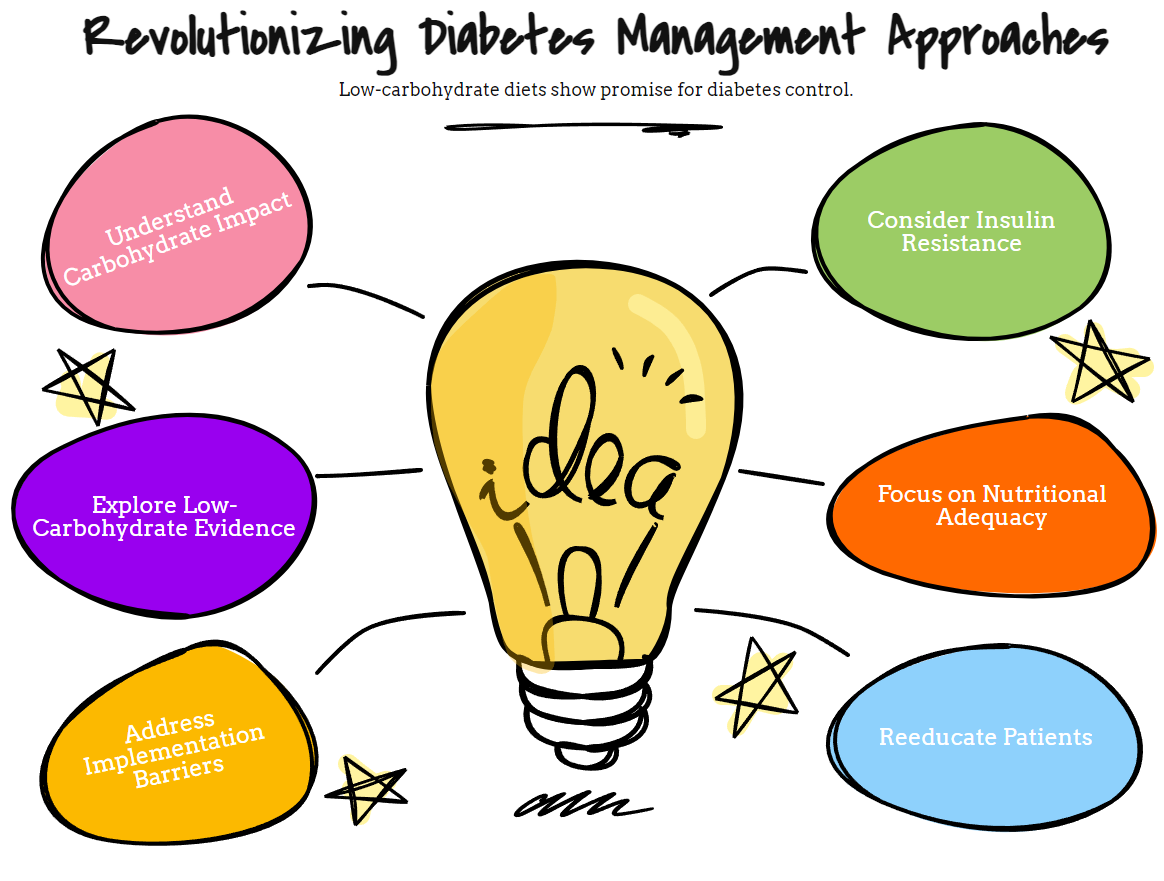
Rethinking Diabetes Care Through Low Carbohydrate Approaches
Rethinking Diabetes Care Through Low Carbohydrate Approaches
Diabetes management stands at a crossroads. For decades, conventional wisdom dictated high-carbohydrate, low-fat diets as the standard nutritional approach for people with diabetes. This paradigm persists in many clinical settings despite mounting evidence suggesting an alternative path may offer superior outcomes for many patients.
The scientific literature increasingly supports low-carbohydrate dietary interventions as practical tools for glycemic control, medication reduction, and metabolic health improvement in diabetes care. Yet this approach remains underutilized and often misunderstood within mainstream medical practice.
The Limitations of Traditional Approaches
Standard diabetes care has traditionally focused on medication management alongside dietary guidelines that recommend 45-60% of calories from carbohydrates. This approach attempts to manage the symptoms of diabetes while patients continue consuming the very macronutrient that most directly elevates blood glucose.
Consider the fundamental physiology: carbohydrates convert to glucose during digestion, directly raising blood sugar. For individuals with impaired glucose metabolism, this creates a perpetual challenge requiring escalating medication to counterbalance dietary choices.
The results speak volumes. Despite advances in pharmacology, diabetes progression remains common. Many patients experience worsening metabolic health over time, requiring additional medications with increasing side effects and costs.
The Carbohydrate Insulin Model
To understand the low-carbohydrate paradigm requires revisiting basic endocrinology. When we consume carbohydrates, blood glucose rises, triggering insulin secretion. Insulin facilitates glucose uptake into cells while inhibiting fat oxidation and promoting fat storage.
This metabolic pathway becomes problematic for people with insulin resistance or impaired insulin production. The carbohydrate-insulin model suggests that significantly reducing dietary carbohydrates can minimize both glucose excursions and insulin requirements.
This approach addresses the underlying pathophysiology rather than merely treating symptoms. By reducing the primary driver of hyperglycemia, patients often experience improved glycemic control with reduced medication needs.
The Evidence Base
Research supporting low-carbohydrate approaches for diabetes management has grown substantially. Multiple randomized controlled trials demonstrate that carbohydrate restriction improves glycemic control, reduces medication requirements, and often leads to weight loss.
Virta Health's clinical trial showed that after two years, patients following a well-formulated ketogenic diet maintained significant improvements in HbA1c while reducing or eliminating diabetes medications. Similar findings have emerged from studies at institutions ranging from Duke University to the University of Indiana.
Beyond glycemic control, low-carbohydrate approaches frequently improve other metabolic markers. Triglycerides typically decrease, HDL cholesterol often increases, and markers of inflammation may improve. Blood pressure reductions are common, particularly as weight normalizes.
Addressing Common Concerns
Critics of low-carbohydrate approaches often raise concerns about sustainability, nutritional adequacy, and long-term safety. These deserve careful consideration.
Regarding sustainability, adherence rates in clinical trials of low-carbohydrate diets compare favorably to other dietary interventions. The satiety provided by adequate protein and fat, combined with reduced hunger from lower insulin levels, often makes these approaches surprisingly sustainable for many patients.
Nutritional adequacy requires attention, but is entirely achievable. Well-formulated low-carbohydrate diets emphasize nutrient-dense foods like non-starchy vegetables, high-quality proteins, and healthy fats. With proper guidance, these diets can provide comprehensive nutrition while limiting carbohydrates.
Long-term safety data continues to accumulate. Concerns about cardiovascular outcomes have not materialized in clinical trials, and many cardiovascular risk markers improve with carbohydrate restriction. The decades-long fear of dietary fat appears increasingly unsupported by modern nutritional science.
Implementation Challenges
Despite growing evidence, implementing low-carbohydrate approaches faces significant barriers. Medical education rarely provides adequate nutrition training, leaving many practitioners unfamiliar with carbohydrate restriction principles. Institutional inertia and clinical practice guidelines that lag behind current evidence further complicate adoption.
Patients themselves often face conflicting information. After years of being advised to eat "healthy whole grains" and avoid fat, the transition to low-carbohydrate eating requires significant reeducation and support.
Financial considerations also play a role. Pharmaceutical management of diabetes represents a massive industry, while nutritional interventions generate little revenue for healthcare systems or the industry. This economic reality subtly influences research priorities and practice patterns.
A Path Forward
Advancing the low-carbohydrate paradigm requires a multifaceted approach. Continued research, particularly long-term studies, will strengthen the evidence base. Improved medical education must equip healthcare providers with nutritional knowledge beyond outdated paradigms.
Patient-centered care demands therapeutic options. Not every person with diabetes will choose or benefit from the same approach. Low-carbohydrate interventions represent a powerful tool that should be available alongside other evidence-based options.
The diabetes epidemic continues unabated worldwide. Conventional approaches have failed to stem this tide. The low-carbohydrate paradigm offers a physiologically sound, evidence-supported alternative that addresses the fundamental metabolic disruptions in diabetes.
For patients struggling with diabetes progression despite following conventional advice, and for clinicians frustrated by limited success with standard approaches, the low-carbohydrate paradigm deserves serious consideration. The evidence suggests that for many, it may offer the most direct path to improved metabolic health and diabetes reversal.
